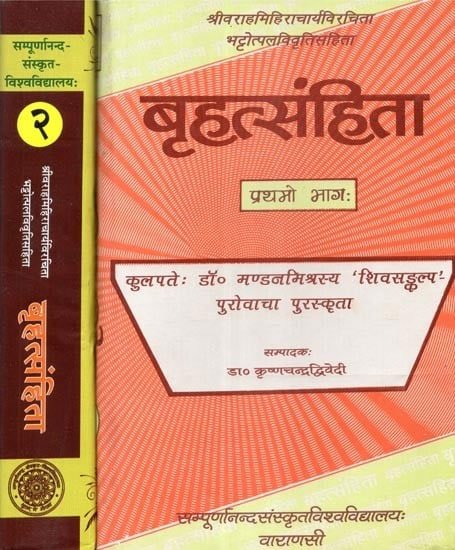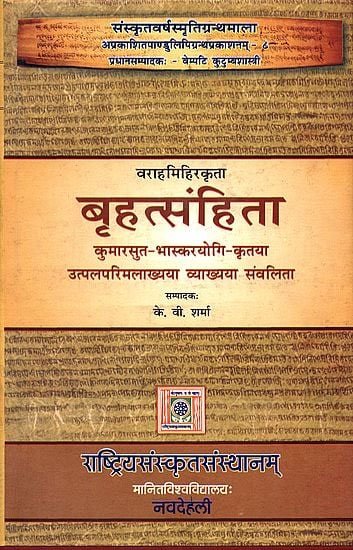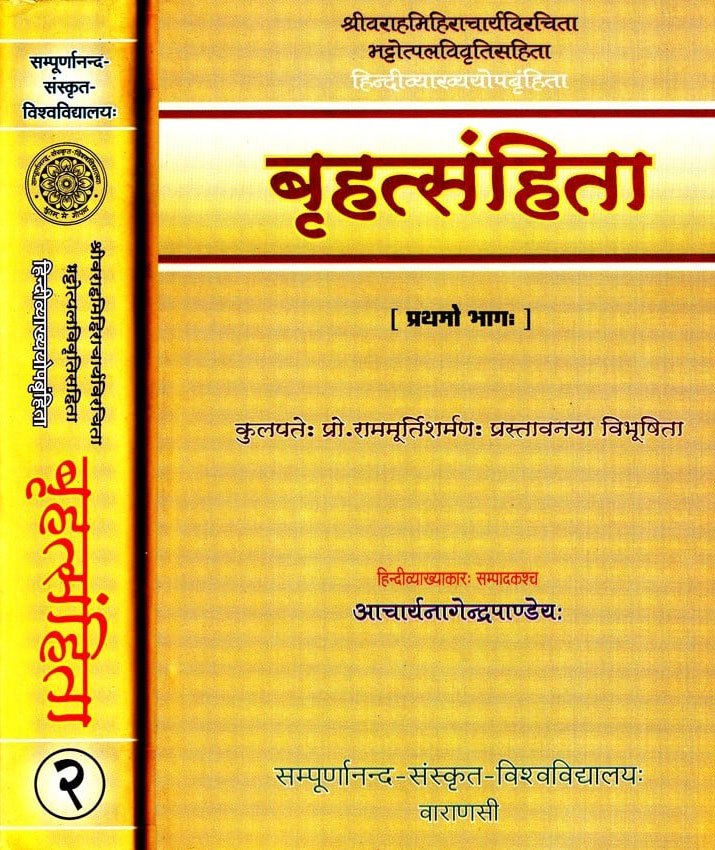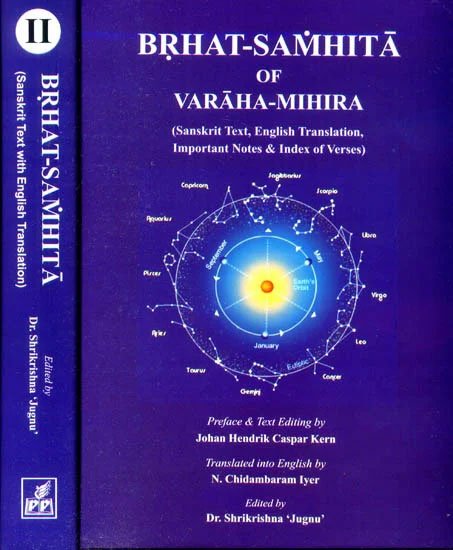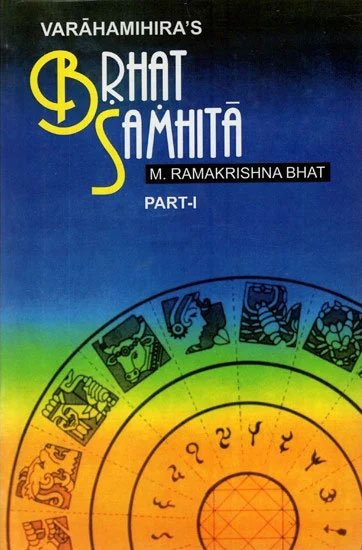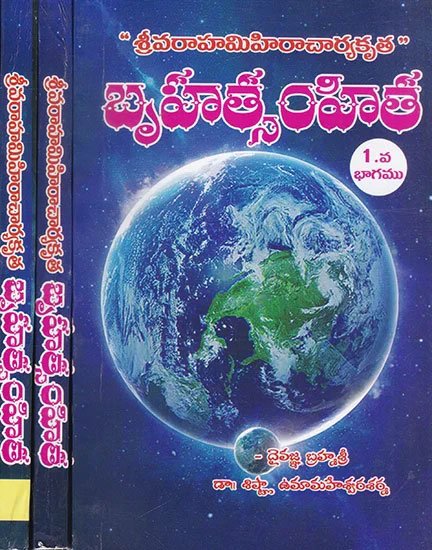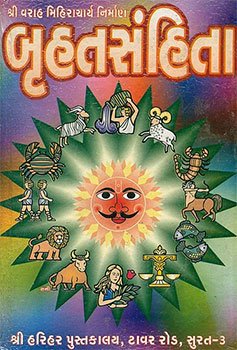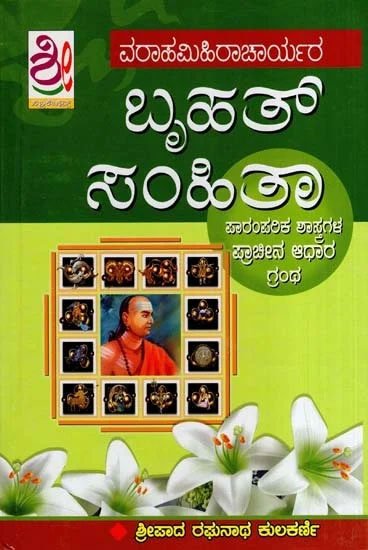Brihat-samhita [sanskrit]
26,560 words
The Sanskrit text of the Brihat-samhita from the 6th-century authored by Varaha Mihira in present-day Ujjain, India. It primarily deals with astrology and astronomy but is presented as an encyclopedia of knowledge.
Verse 42.65
धूमावृते शिखिभयं तमसा च मोहो व्यालैश्च भग्नपतितैर्न भवत्यमात्याः ।
ग्लायन्त्युदक्प्रभृति च क्रमशो द्विजाद्यान्भङ्गे तु बन्धकिबधः कथितः कुमार्याः ॥ ६५ ॥
[द्विजाद्या । वधः]
dhūmāvṛte śikhibhayaṃ tamasā ca moho vyālaiśca bhagnapatitairna bhavatyamātyāḥ |
glāyantyudakprabhṛti ca kramaśo dvijādyānbhaṅge tu bandhakibadhaḥ kathitaḥ kumāryāḥ || 65 ||
[dvijādyā | vadhaḥ]
The Sanskrit text of Verse 42.65 is contained in the book Brihata Samhita (Sanskrit Text with Hindi Translation) by Pandit Achyutananda Jha. This book is available online or you could buy the latest edition:
Read online Buy now! The Sanskrit text by Pandit Achyutananda Jha (2001)
Glossary of Sanskrit terms
Note: This extracts Sanskrit terms and links to English definitions from the glossary, based on an experimental segmentation of verse (42.65). Some terms could be superfluous while some might not be mentioned. Click on the word to show English definitions.
Dhuma, Rite, Rita, Riti, Shikhibhaya, Tamas, Tamasa, Moha, Vyala, Bhagna, Patita, Bhavati, Bhavat, Bhavant, Amatya, Glayat, Glayanti, Udak, Udac, Kramashah, Kramashas, Dvija, Yat, Yah, Bhanga, Bhangi, Bandhaki, Badha, Kathita, Kumari,
Analysis of Sanskrit grammar
Note: this is an experimental feature and only shows the first possible analysis of the Sanskrit text (Verse 42.65). If the system was successful in segmenting the sentence, you will see of which words it is made up of, generally consisting of Nouns, Pronouns, Verbs, Participles and Indeclinables. Click on the link to show all possible derivations of the word.
- Line 1: “dhūmāvṛte śikhibhayaṃ tamasā ca moho vyālaiśca bhagnapatitairna bhavatyamātyāḥ ”
- dhūmāvṛ -
-
dhūma (noun, masculine)[nominative dual], [vocative dual], [accusative dual]
- ṛte -
-
ṛte (indeclinable preposition)[indeclinable preposition]ṛte (indeclinable)[indeclinable]ṛta (noun, masculine)[locative single]ṛta (noun, neuter)[nominative dual], [vocative dual], [accusative dual], [locative single]ṛtā (noun, feminine)[nominative dual], [vocative single], [vocative dual], [accusative dual]ṛti (noun, feminine)[vocative single]ṛti (noun, masculine)[vocative single]
- śikhibhayam -
-
śikhibhaya (noun, masculine)[adverb], [accusative single]śikhibhaya (noun, neuter)[adverb], [nominative single], [accusative single]
- tamasā -
-
tamas (noun, neuter)[instrumental single]tamasā (noun, feminine)[nominative single]
- ca -
-
ca (indeclinable conjunction)[indeclinable conjunction]ca (noun, masculine)[compound], [vocative single]ca (noun, neuter)[compound], [vocative single]
- moho* -
-
moha (noun, masculine)[nominative single]
- vyālaiś -
-
vyāla (noun, masculine)[instrumental plural]vyāla (noun, neuter)[instrumental plural]
- ca -
-
ca (indeclinable conjunction)[indeclinable conjunction]ca (noun, masculine)[compound], [vocative single]ca (noun, neuter)[compound], [vocative single]
- bhagna -
-
bhagna (noun, masculine)[compound], [vocative single]bhagna (noun, neuter)[compound], [vocative single]
- patitair -
-
patita (noun, masculine)[instrumental plural]patita (noun, neuter)[instrumental plural]√pat -> patita (participle, masculine)[instrumental plural from √pat class 1 verb]√pat -> patita (participle, neuter)[instrumental plural from √pat class 1 verb]
- na -
-
na (indeclinable particle)[indeclinable particle]na (noun, masculine)[compound], [vocative single]na (noun, neuter)[compound], [vocative single]
- bhavatya -
-
bhavatī (noun, feminine)[compound], [adverb], [nominative single], [vocative single]bhavat (noun, masculine)[locative single]bhavat (noun, neuter)[nominative dual], [vocative dual], [accusative dual], [locative single]bhavant (pronoun, masculine)[locative single]bhavant (pronoun, neuter)[nominative dual], [accusative dual], [locative single]bhavant (pronoun, feminine)[nominative single]√bhū (verb class 1)[present active third single]
- amātyāḥ -
-
amātya (noun, masculine)[nominative plural], [vocative plural]
- Line 2: “glāyantyudakprabhṛti ca kramaśo dvijādyānbhaṅge tu bandhakibadhaḥ kathitaḥ kumāryāḥ || 65 |”
- glāyantyu -
-
√glai -> glāyat (participle, neuter)[nominative dual from √glai class 1 verb], [nominative plural from √glai class 1 verb], [vocative dual from √glai class 1 verb], [vocative plural from √glai class 1 verb], [accusative dual from √glai class 1 verb], [accusative plural from √glai class 1 verb], [nominative dual from √glai class 2 verb], [nominative plural from √glai class 2 verb], [vocative dual from √glai class 2 verb], [vocative plural from √glai class 2 verb], [accusative dual from √glai class 2 verb], [accusative plural from √glai class 2 verb]√glai -> glāyantī (participle, feminine)[nominative single from √glai class 1 verb], [vocative single from √glai class 1 verb]√glai (verb class 1)[present active third plural]√glai (verb class 2)[present active third plural]
- udak -
-
udak (indeclinable)[indeclinable]udac (noun, masculine)[compound]udac (noun, neuter)[nominative single], [vocative single], [accusative single]
- prabhṛti -
-
prabhṛti (noun, feminine)[compound], [adverb]
- ca -
-
ca (indeclinable conjunction)[indeclinable conjunction]ca (noun, masculine)[compound], [vocative single]ca (noun, neuter)[compound], [vocative single]
- kramaśo* -
-
kramaśaḥ (indeclinable)[indeclinable]kramaśas (noun, neuter)[compound], [nominative single], [vocative single], [accusative single]
- dvijād -
-
dvija (noun, masculine)[adverb], [ablative single]dvija (noun, neuter)[adverb], [ablative single]
- yān -
-
yat (noun, masculine)[nominative single]yāt (noun, masculine)[nominative single], [vocative single]ya (noun, masculine)[accusative plural]yaḥ (pronoun, masculine)[accusative plural]
- bhaṅge -
-
bhaṅga (noun, masculine)[locative single]bhaṅga (noun, neuter)[nominative dual], [vocative dual], [accusative dual], [locative single]bhaṅgā (noun, feminine)[nominative dual], [vocative single], [vocative dual], [accusative dual]bhaṅgi (noun, feminine)[vocative single]
- tu -
-
tu (indeclinable particle)[indeclinable particle]
- bandhaki -
-
bandhakī (noun, feminine)[adverb], [vocative single]
- badhaḥ -
-
badha (noun, masculine)[nominative single]
- kathitaḥ -
-
kathita (noun, masculine)[nominative single]√kath -> kathita (participle, masculine)[nominative single from √kath class 10 verb]
- kumāryāḥ -
-
kumārī (noun, feminine)[ablative single], [genitive single]
- Cannot analyse 65
- Line 3: “[dvijādyā ”
- dvijād -
-
dvija (noun, masculine)[adverb], [ablative single]dvija (noun, neuter)[adverb], [ablative single]
- yā -
-
yā (indeclinable relative)[indeclinable relative]yā (noun, feminine)[nominative single]yā (pronoun, feminine)[nominative single]
Other editions:
Also see the following editions of the Sanskrit text or (alternative) English translations of the Verse 42.65
Brhatsamhita with the Commentary of Bhattotpala
by Krishna Chandra Dwivedi (2016)
Publisher: Sampurnanand Sanskrit University; 1229 pages;
Buy now!
Brihat Samhita with the Commentary of Utpalapatimala of Yogisvara
by K. V. Sharma (2012)
Publisher: Rashtriya Sanskrit Sansthan, Janakpuri; 754 pages; ISBN-10; 8186111360; ISBN-13: 9788186111369
Buy now!
Brihat Samhita (Hindi Translation)
by K. V. Sharma (2002)
Publisher: Sampurnanand Sanskrit University; 2359 pages; ISBN-13: 9789387890008.
Buy now!
Brhat Samhita (English translation)
by N. Chidambaram Iyer (2022)
Publisher: Parimal Publication Pvt. Ltd.; 801 pages; Edited by Dr. Shrikrishna Jugnu; ISBN-10: 8171104215; ISBN-13: 9788171104215.
Buy now!
Brhat Samhita (English with notes)
by M. Ramakrishna Bhat (2010)
Publisher: Motilal Banarsidas Publishers Pvt. Ltd.; 1155 pages; ISBN-10: 8120810600; ISBN-13: 9788120810600.
Buy now!
Brhat Samhita (Telugu translation)
by Sishtla Umamaheswara Sharma (2020)
Publisher: Mohan Publications, Andhra Pradesh; 846 pages.
Buy now!Preview of verse 42.65 in Kannada sript:
ಧೂಮಾವೃತೇ ಶಿಖಿಭಯಂ ತಮಸಾ ಚ ಮೋಹೋ ವ್ಯಾಲೈಶ್ಚ ಭಗ್ನಪತಿತೈರ್ನ ಭವತ್ಯಮಾತ್ಯಾಃ ।
ಗ್ಲಾಯನ್ತ್ಯುದಕ್ಪ್ರಭೃತಿ ಚ ಕ್ರಮಶೋ ದ್ವಿಜಾದ್ಯಾನ್ಭಙ್ಗೇ ತು ಬನ್ಧಕಿಬಧಃ ಕಥಿತಃ ಕುಮಾರ್ಯಾಃ ॥ ೬೫ ॥
[ದ್ವಿಜಾದ್ಯಾ । ವಧಃ]
Brhat Samhita (Gujarati translation)
by - (2000)
Publisher: Shree Harihar Pustakalay, Surat; Author: Shri Varahamihira Acharya (શ્રી વરાહમિહીરાચાર્ય); 432 pages.
Buy now!Preview of verse 42.65 in Gujarati sript:
ધૂમાવૃતે શિખિભયં તમસા ચ મોહો વ્યાલૈશ્ચ ભગ્નપતિતૈર્ન ભવત્યમાત્યાઃ ।
ગ્લાયન્ત્યુદક્પ્રભૃતિ ચ ક્રમશો દ્વિજાદ્યાન્ભઙ્ગે તુ બન્ધકિબધઃ કથિતઃ કુમાર્યાઃ ॥ ૬૫ ॥
[દ્વિજાદ્યા । વધઃ]
Brhat Samhita (Kannada translation)
by Sripada Raghunatha Kulkarni (2021)
Publisher: Srinidhi Publications, Bangalore; 668 pages with illustrations.
Buy now!Preview of verse 42.65 in Kannada sript:
ಧೂಮಾವೃತೇ ಶಿಖಿಭಯಂ ತಮಸಾ ಚ ಮೋಹೋ ವ್ಯಾಲೈಶ್ಚ ಭಗ್ನಪತಿತೈರ್ನ ಭವತ್ಯಮಾತ್ಯಾಃ ।
ಗ್ಲಾಯನ್ತ್ಯುದಕ್ಪ್ರಭೃತಿ ಚ ಕ್ರಮಶೋ ದ್ವಿಜಾದ್ಯಾನ್ಭಙ್ಗೇ ತು ಬನ್ಧಕಿಬಧಃ ಕಥಿತಃ ಕುಮಾರ್ಯಾಃ ॥ ೬೫ ॥
[ದ್ವಿಜಾದ್ಯಾ । ವಧಃ]
![Brihat-samhita [sanskrit] - book cover](/uploads/a/Brihat-Samhita-Sanskrit.jpg)
